Effective Ways to Free Up Space on Computer Disk – Storage space is a problem that many users deal with. In this guide , we will talk about freeing up storage space, freeing up space, cleaning windows disk, freeing up space on c disk.
5 Effective Ways to Free Up Disk Space!
Hard drives are getting bigger, but somehow they’re always full. This is more true if you are using a solid state drive (SSD), which offers much less hard disk space than traditional mechanical hard drives.
If your hard disk space is not enough, this article will help you free up space for your important files and programs. You can enable the windows 10 process to free up space on the computer by following the items below .
You can also do the same things for windows 10 windows 7 to free up space on the C disk .
1-) Run Disk Cleanup
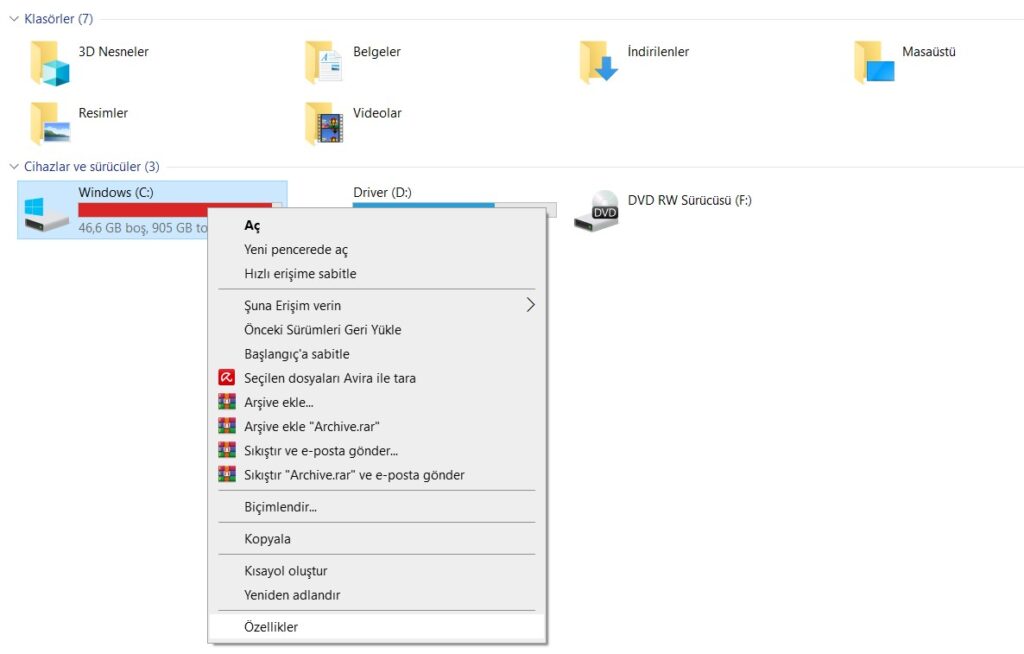
Windows includes a built-in tool that deletes temporary files and other important data.
To access it, right-click one of the hard drives in the Computer window and select Properties. (Alternatively, you can search for Disk Cleanup in the Start Menu.) Inthe disk properties window, click the Disk Cleanup button.
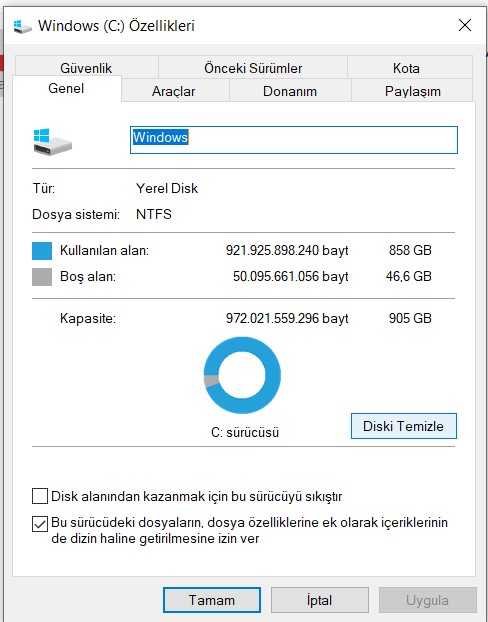
Wait a little. It’s scanning.
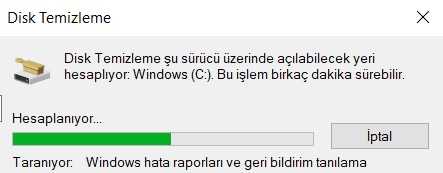
Select the file types you want to delete and click OK. This includes temporary files, log files, files in your recycle bin, and other junk files.
Here you can also clean system files that do not appear in the list. If you want to delete system files as well, click the Clean up system files button.
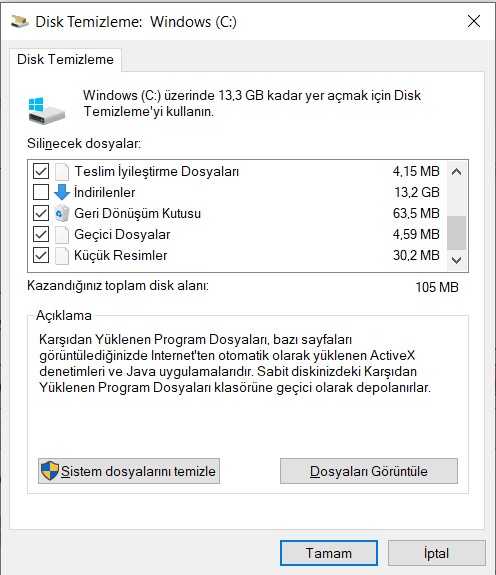
2-) Uninstall the Programs You Don’t Use!
Uninstalling programs can free up space, but some programs use very little space. In the Programs and Features control panel, you can click the Size column to see how much space each program installed on your computer uses. The easiest way to get there is to search for “Uninstall a Program” from the Start Menu.
If you don’t see this column, click the options button in the upper-right corner of the list and select the Details view. Note that this is not always true – some programs do not report the amount of space they are using.
A program may be using a lot of space, but there may be no information in the size column.
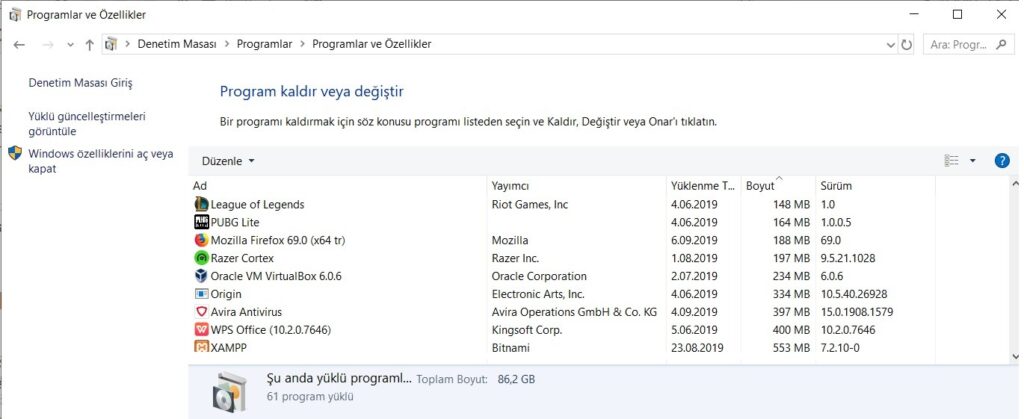
3-) Analyze Disk Space
You can use a hard disk analysis program to find out exactly what is being used on your hard drive. These apps scan your hard drive and show you exactly which files and folders are taking up the most space. We’ve covered the 10 best tools for analyzing hard disk space, but if you want one to get started, try WinDirStat (Download from Ninite).
After scanning your system, WinDirStat will show you exactly which folders, file types and files are using the most space. Make sure you don’t delete important system files – only personal data files.
If you see a program’s folder in the Program Files folder using too much space, you can uninstall it – WinDirStat can tell you how much space a program is using, even without the Programs and Features Control Panel.
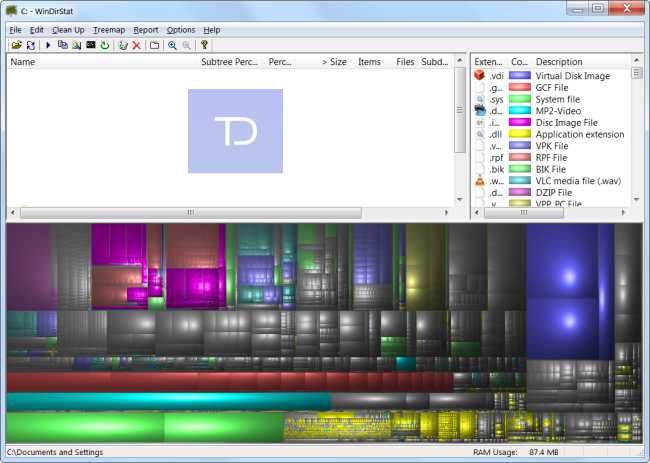
4-) Clear temporary files
Windows’ Disk Cleanup tool is useful, but it doesn’t delete temporary files used by other programs. For example, it will not clear the Firefox or Chrome browser caches, which can use up hard disk space.
(Your browser cache uses hard disk space to save you time accessing future websites, but that’s a minor convenience if you need hard disk space now.)
For more aggressive temporary and junk file cleaning, try CCleaner, which you can download here.
CCleaner cleans junk files from various third-party programs and also cleans Windows files that Disk Cleanup won’t touch.
5-) Find Duplicate Files
You can use the duplicate file finder app to scan your hard drive for unnecessary and potentially deleteable duplicate files. We used VisiPics to ban duplicate images and also created a comprehensive guide to find and delete duplicate files using free tools on Windows.
Or if you don’t mind spending a few bucks, you can use Duplicate Cleaner Pro which not only has a nicer interface but also has tons of extra features to help you find and delete duplicate files.
ATTENTION RISKY ROADS
These tricks will definitely save space, but they disable important Windows features. We don’t recommend using any of them, but if you desperately need disk space, they might be able to help:
- Disable Hibernation – When hibernating your system, it saves the contents of RAM to your hard drive. This allows it to save the system state without any power usage – the next time you start your computer, you’ll be back where you left off. Windows saves the contents of your RAM to the C:\hiberfil.sys file. To save hard drive space, you can disable hibernation completely and remove the file.
- Disable System Restore – If reducing the amount of space used by System Restore is not enough for you, you can disable System Restore entirely. If you need to use System Restore to restore your system to an earlier state, you’re out of luck.